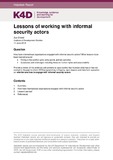| dc.contributor.author | Enfield, Sue | |
| dc.date.accessioned | 2019-07-16T10:43:01Z | |
| dc.date.available | 2019-07-16T10:43:01Z | |
| dc.date.issued | 2019-06-11 | |
| dc.identifier.citation | Enfield, S. (2019). Lessons of working with Informal Security Actors. K4D Helpdesk Report. Brighton, UK: Institute of Development Studies | en |
| dc.identifier.uri | https://opendocs.ids.ac.uk/opendocs/handle/20.500.12413/14583 | |
| dc.description | No permissions. | en |
| dc.description.abstract | Security sector reform (SSR) and Security and Justice (S&J) programmes have become a part of standard procedure for donors operating in fragile, failed and conflict-affected states. This rapid literature review sought to understand how international organisations have engaged with informal security actors. The inclusion of non-state actors in reform processes or security negotiations is repeatedly mentioned as desirable and means working with civil society, media and religious organisations. Although a common criticism of SSR in the literature is one of failing to be inclusive of non-state actors. A multi-layered approach to community security and safety policy should consider the combined contributions of state, community-based, and commercial groups or structures. Security analysts, policy makers and practitioners agree about the need to move to a ‘second generation’ model for SSR moving beyond traditional engagement with State judiciary and security organs. Although there is no accepted formula yet, one characteristic in this evolving landscape is a willingness to engage with non-state actors. The shifts from linear approaches to State building, working on policy and capacity of state security actors towards more inclusive justice where communities using customary justice structures are involved in diagnosis and programme design. This provides a strong rationale for including non-state actors although it is important to guard against the power inherent in traditional structures that may exclude women. | en |
| dc.language.iso | en | en |
| dc.publisher | IDS | en |
| dc.relation.ispartofseries | K4D Helpdesk Report;608 | |
| dc.rights.uri | https://www.nationalarchives.gov.uk/doc/open-government-licence/version/3/ | en |
| dc.subject | Politics and Power | en |
| dc.subject | Security and Conflict | en |
| dc.subject | Work and Labour | en |
| dc.title | Lessons of Working with Informal Security Actors | en |
| dc.type | Helpdesk | en |
| dc.rights.holder | © DFID - Crown copyright 2019 | en |
| dcterms.dateAccepted | 2019-06-11 | |
| rioxxterms.funder | Department for International Development, UK Government | en |
| rioxxterms.identifier.project | K4D | en |
| rioxxterms.version | VoR | en |
| rioxxterms.funder.project | 238a9fa4-fe4a-4380-996b-995f33607ba0 | en |

